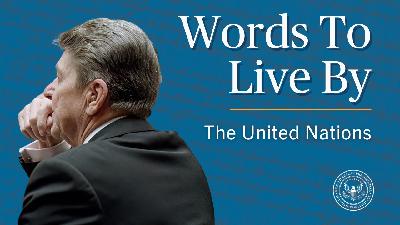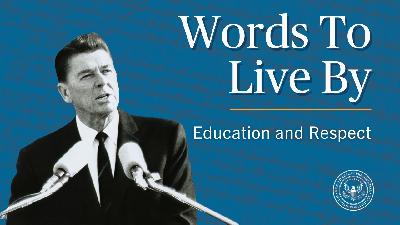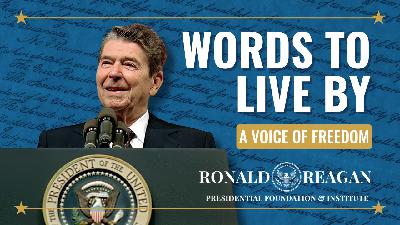Discover Words to Live By
Words to Live By

Words to Live By
Author: The Ronald Reagan Presidential Foundation and Institute
Subscribed: 1Played: 9Subscribe
Share
© Copyright 2024 All rights reserved.
Description
An audio podcast featuring Ronald Reagan speeches and radio addresses from the 1960s through the 1990s. A new Words to Live By Podcast will be posted every Tuesday.
103 Episodes
Reverse
President Reagan’s disappointment in and distrust of international organizations is vividly apparent in his radio commentaries from 1975-1980. It was Dag Hammarskjöld, the tragic second UN secretary general, who said it best. The United Nations, he said, “was created not to lead mankind to heaven but to save humanity from hell."
After the recent uprisings at many of America’s collegiate institutions, we thought we’d look back on how Governor Reagan handled the situation, 50 years ago in the late 60’s and early 70’s. In his 1966 campaign for California governor, Republican Ronald Reagan promised to "clean up the mess at Berkeley." At the time, he was referring to the unrest prevalent not just at the University of California, Berkeley, but on college campuses throughout the state. Students and faculty alike were engaged in protests, demonstrations, and strikes related to issues such as the draft, civil rights, discrimination, and women’s liberation. In one 1966 campaign speech, Reagan declared that many leftist campus movements had transcended legitimate protest, with the actions of "beatniks, radicals and filthy speech advocates" having become more to do "with rioting, with anarchy" than "academic freedom." His core message was, "Anarchy in the name of academic freedom on the campus or on our streets, will not be tolerated...."
Throughout his presidency, the subject of Cuba was frequently raised. In frustration, on one occasion, the president asked, “When’s the last time you heard someone swimming TO Cuba?” But long before he sat in the Oval Office, Ronald Reagan commented on a documentary that had been crafted on Cuba.
In today’s podcast we honor our veterans and in the president’s messages to veterans, we’ll cover peace through strength. Going through our archives, Citizen, Governor and President Reagan delivered many addresses saluting those who serve our country. Today we’ve chosen two – the first he delivered in August 1980 to the Veterans of Foreign Wars. The theme was Peace because, in candidate Ronald Reagan’s view, Peace was the first purpose of American foreign policy. So in saluting the sacrifices made by veterans, President Reagan stresses that to protect these men and find a path toward peace, we must focus on peace through strength. He covers why he thinks American foreign policy has been working against peace and how that trend could be reversed. In the second half of the podcast, we’ll hear when he addressed the American people in honor of Veterans Day 40 years ago in 1983. Of course, this address was focused on the veterans of both the Grenada and Beirut operations.
40 years ago at this time, our then 40th president was running for a second term. And just what did the polls say? Well, by the end of October 1984, the latest national opinion polls strongly favored President Reagan. Newsweek’s poll showed the president ahead by 17 points: a USA Today poll showed his lead at 23 points and US News and World Report said that its state-by-state survey showed Mr. Reagan way ahead in 45 out of the 50 states and the President “on his way to a smashing victory on November 6.” In addition to traditional campaign stops, the President used his bully pulpit to pursue his agenda; specifically, those radio addresses. So in today’s podcast, we’ll tune into one he sent in September 1984.
In January 1983, 40 years ago, the President began his third year in office, working desperately to improve the economy while determined to convince the American people that the best was yet ahead. As a true leader, he met with his Executive team, exactly two years after his inauguration, to introduce two new cabinet members and to rally his executive squad to keep pushing the ball up the hill. His remarks are funny, inspiring, engaging and a perfect start to working with a brilliant team of individuals. We thought you’d like a taste of our 40th president’s leadership style in this new year: his vision, communication and optimism. You’ll hear him announce that Elizabeth Dole would replace Drew Lewis as Secretary of Transportation and Margaret Heckler would replace Richard Schweiker as Secretary of Health and Human services.
In this week’s podcast, we present Ronald Reagan’s famous October 27, 1964 “A Time For Choosing” speech.
The complexity of dealing with problems in the Middle East was pervasive during the Reagan years but the 40th President continued to pursue a path to peace. In February 1984, he invited President Hosni Mubarak of Egypt and King Hussein of Jordan to Washington to discuss the war in Lebanon and other issues. Things were hot in the Middle East. By early 1984, US forces were directly fighting in the Persian Gulf. In late February, a US Navy destroyer launched anti-aircraft missiles against Iranian patrol aircraft. At the end of May, a USAF KC-10 tanker helped Saudi Air Force jets maintain patrols over the Gulf to head off Iranian retaliation for Iraqi attacks on oil tankers. In early June, the USAF tankers and AWACS assisted the Saudis in shooting down one or two Iranian F-4 Phantom fighter-bombers. So, US military forces played a frequent and direct combat role in regional conflicts during 1984. Therefore, in constant pursuit of communication at least, President Mubarak of Egypt and King Hussein of Jordan visited. First, let’s talk about Jordan and Hussein.
In 1984, forty years ago, the Reagan-Bush campaign launched a highly praised television ad blitz proclaiming, "It's Morning Again in America." The ads underscored a theme at the center of Reagan's campaign: that America was "Prouder, Stronger, and Better" under President Reagan's leadership. And while those great “Morning in America” campaign ads were running, the President was riding the campaign trail. In today’s podcast, we’ll feature excerpts from a quintessential campaign speech where the candidate tells you what he did, then tells you again, and then, of course, tells us again.
In September 1984, the day after the President addressed the UN, he addressed a meeting of the World Bank and the International Monetary Fund. The World Bank was established along with the International Monetary Fund in 1944, at the Bretton Woods Conference. The Bank is an international financial institution that provides loans and grants to the governments of low and middle income countries for the purpose of pursuing capital projects. During the 1980s, the bank emphasized lending to service Third World debt and making structural adjustment policies that were designed to streamline the economies of developing nations. The International Monetary Fund (IMF) oversees the stability of the world's monetary system, while the World Bank aims to reduce poverty by offering assistance to middle-income and low-income countries. You’ll hear in these remarks, that while the President lauds the work of the World Bank and IMF, he does clarify where American support needs to be because as he said: "While we would not impose our ideas, our policies, on anyone, we felt obliged to point out that no nation can have prosperity and successful development without economic freedom."
So 40 years ago at this time, our then 40th president was running for a second term. And just what did the polls say? Well, by the end of October 1984, the latest national opinion polls strongly favored President Reagan. Newsweek’s poll showed the president ahead by 17 points: a USA Today poll showed his lead at 23 points and US News and World Report said that its state-by-state survey showed Mr. Reagan way ahead in 45 out of the 50 states and the President “on his way to a smashing victory on November 6.” In addition to traditional campaign stops, the President used his bully pulpit to pursue his agenda; specifically, those radio addresses. So in today’s podcast, we’ll tune into one he sent in September 1984.
Most people don’t associate Ronald Reagan with country music, but in today’s podcast, we’ll hear another side! The President actually journeyed to Nashville, Tennessee to celebrate the birthday of one of country music’s all-time greats, Roy Acuff. He met with Mr. Acuff and his family early in the day, then journeyed to the Grand Ole Opry Theater at Opryland, USA to deliver these remarks. You’ll hear the President mention Barbara Mandrell early on because as you might recall, she had been in a terrible automobile accident.
The Press. In this podcast, we’ll cover some interesting, short, informal exchanges between the President and the Press in September 1984 – Yes, the president was in the intense throes of a political campaign and at the same time, it was the height of tensions with the Soviet Union when an impromptu meeting with Andre Gromyko, the Soviet foreign minister, was arranged. Above all, we have to remember that the story of the White House cannot be told without discussing interactions between presidents and the press. Sometimes cordial, sometimes confrontational, this relationship is fueled by the public’s desire for news about the leader of the nation and the administration’s work. Yes, all American presidents have a love-hate relationship but the harsh reality is they have to deal with them.
Ok a little quiz…when I say August 1984 and Ronald Reagan, what comes to mind? His acceptance of the presidential nomination, of course. It’s important to remember that the President regarded the 1984 election as pivotal. Why? Because he believed the gains he had made during his first four years were in jeopardy. He wanted to preserve what he had accomplished and there were still things he wanted to do. What were those two things? Cutting the deficit and balancing the budget. Although an economic expansion was underway, he thought he could do more to stimulate the economy by making our tax system fairer and simpler. Our optimistic 40th president believed he could persuade Congress to cut more waste out of the budget and continue making our government smaller and less intrusive. So for this week’s podcast, we’ll walk down memory lane with the President to hear his remarks when accepting the nomination in 1984 in Dallas, Texas, what his objectives were, and his thoughts on his opponent, Walter Mondale. You’ll hear the President refer to San Francisco because that’s where the Democrats held their convention in July of 1984.
The Warsaw Uprising, which officially began on August 1, 1944, and lasted until October 2, 1944, was a major military endeavor of the Polish resistance movement during World War II. From the beginning, civilians were embroiled in the 63-day conflict enduring relentless airstrikes and the resulting fires that forced them from their homes. They were also working to procure arms, provide supplies for insurgents, erect defensive barriers, extinguish fires, and carry messages underground. Yet, as the Soviets halted their offensive—which to this point had been a remarkable success—Nazi units had time to regroup and organize a counteroffensive, forcing the armed insurrection to hold out much longer than originally planned. Civilians were initially in favor of the uprising since they believed that the fighting would last only a few days. As the unrest raged on and Warsaw received little help from the Soviets, however, civilian support diminished, leading to tensions between the AK or the Polish army and the population of Warsaw. Remember, in 1984, the Polish people were again fighting for their freedom from the Soviets, a struggle that the President addresses in this speech.
We know our current Congress ranks as one of the most inactive in history. Here are the stats: the 118th Congress, at the end of 2023, hit a historical mark for inactivity, the lowest tally since the Great Depression. Now let’s go back 40 years ago, when President Reagan became so frustrated with Congress, that he drafted a radio address to alert the American people to his massive frustration.
From the end of July through August 11th, the world has been and will be focused on the city of light, Paris, as that beautiful historic city hosts the 33rd Olympiad. Do you know why Paris was called the City of Light? Because at the beginning of the 19th century, it became the first city in Europe to use gas lighting to illuminate its streets. And yes, the summer Olympics will be the subject of today’s podcast.
In 1984, the economy was in an upswing. Oil prices were low, interest rates were high, and the lurking problem of the mounting federal deficit caused little public concern. Our popular President Reagan was earning the label "the Teflon president" for his ability to escape unscathed from setbacks. So, the challenging task of running against Ronald Reagan fell to former Vice President Walter Mondale who made two bold choices in his campaign, both of which backfired. First, he selected a woman, New York Representative Geraldine Ferraro, as his running mate. Media scrutiny of her husband’s finances put Ferraro on the defensive. Second, Mondale announced in his acceptance speech that he would raise taxes to fight the deficit. Seizing on such a position, President Reagan succeeded in tagging Mondale as a typical free-spending Democrat and won the most lopsided electoral victory since 1936: 49 out of 50 states.
Fifteen years after the Apollo 11 lunar landing, the President invited the crew members to the White House for a celebration. You’ll be intrigued by the President’s remarks – he gives a little history and in the second half of the podcast, we’ll hear him explain all the inventions that have emerged from the space program. After his speech, you’ll hear Neil Armstrong speak and present the President with a gift, a small American flag that the crew had taken to the moon in 1969. Today, it’s been 55 years since that historic landing. Recall that at 1:18 pm, Pacific Daylight Time on July 20, 1969, Armstrong and Aldrin brought down the lunar lander Eagle on the moon's surface. Collins remained in the command module Columbia, which orbited 69 miles above. Five more missions sent ten more men to the moon’s cratered surface and 843 pounds of precious lunar rocks and soil were returned for analysis.
This year, it’s been estimated that about 350 million people will visit our national parks. Now if you’re wondering why I’m speaking about national parks, perhaps it’s important to remember that Ronald Reagan was a serious outdoorsman. In April 1977, he wrote a radio address about the environment, four years before becoming president. And in 1984, he addressed the National Campers and Hikers Association in Bowling Green, Kentucky. As governor of California, Ronald Reagan had an admirable record of safeguarding the environment, to the surprise of some of his critics. Governor Reagan’s administration added 145,000 acres of parkland, more than any other modern California governor. He enforced new, tougher measures on air and water quality. He stopped plans for dams on two rivers, the Feather and the Eel, despite intense pressure from commercial interests and signed into law a bill to protect California’s wild and scenic rivers.







